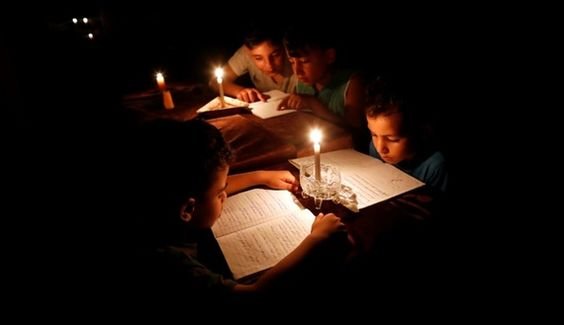Taking the basics for granted (but not in Gaza)
It doesn't matter the season, the weather always gives people something to talk about. "It's hot.......it's cold........too much rain.......too little rain."
We have had a relatively dry winter this year. But this past Friday, in the early morning hours, the rain started. As the night turned into day, the skies went from black to gray. Rain water filled the streets, resulting in flooding in some areas.
Some days have been bitterly cold. And I, like everyone else, complained about the freezing (not literally) temperatures. And it is on these days, as I sit in my warm house, and turn on the space heater for extra warmth, my hands surrounding a mug of coffee, that I look at my children watching tv, and my cat at my feet almost one with the heater........it is days likes these that I remember that I have a lot to be grateful for.
Darkness in Gaza by Noreen Sadik
New Internationalist…..24 October 2017
(link to published article below)
Despite hopes of reconciliation between Palestinian rivals Hamas and Fatah, ordinary Gazans are still living with only four hours of electricity a day.
On his recent visit to the Gaza Strip this month, Peter Maurer, the head of the International Committee of the Red Cross, concluded that the conditions in the Gaza Strip are ‘worsening by the day’. He warned of a ‘crisis of hope’, calling the humanitarian situation ‘dire’.
His remarks echo a 2012 report by the United Nations Country Team that stated that, were trends to continue at the rate they were, the Gaza Strip would become ‘unliveable’ by 2020. Since then conditions have deteriorated even faster than expected.
Today, the most pressing problem in what is often called the world’s largest open-air prison, is a severe lack of electricity.
‘The electricity crisis is the main crisis,’ explains Walid Rouk, a 27-year-old photojournalist and blogger, via e-mail. ‘Electricity means life. It’s the air we breathe, and the water that we drink. When there is no electricity it’s as if we’re not living.’
According to a statement by the International Committee of the Red Cross, ‘All aspects of life have been affected. As a result, a systemic collapse of an already battered infrastructure and economy is impending.’
The largest supplier of electricity in Gaza is the state-owned Israel Electric Corporation. Before the present crisis, electricity was available for eight hours per day. That quota then decreased to four hours before hitting a low of two hours of electricity per day. The partial restoration of power from Egypt at the start of September helped restore the strip to four hours power daily.
The immediate cause of the crisis is the intra-Palestinian dispute between the Palestinian Authority (PA) in the West Bank, run by President Mahmoud Abbas, and the Hamas leadership in Gaza. The split has lasted a decade, and although a deal between the two sides was reached on 12 October, previous such agreements have swiftly collapsed.
The deal has yet to translate to an easing of conditions for ordinary Palestinians, who have become pawns in the power game of the two rivals. In June, the PA cut electricity payments to Israel in order to weaken its rival in Gaza.
According to a publication by the Israeli NGO Gisha, published in June, the total demand for electricity in Gaza is 400-500 megawatts; the actual supply is in between 150 and 200 megawatts.
The precarious state of Gaza’s electricity has had a profoundly destabilizing effect on infrastructure, including the availability of clean water, sewage, sanitation plants, as well as the daily functioning of life. Hospitals have been particularly affected, since there is already a shortage of medical equipment.
Diesel, which is needed for the 87 generators to maintain power to the hospitals during blackouts, is lacking, and an estimated $10 million worth of diagnostic radiology equipment is in danger of being rendered unusable.
Whatever the state of the stand-off between the PA and Hamas, Israel is considered by many to be an occupying power in Gaza and, therefore, ultimately responsible for the crisis.
Although it formally ‘disengaged’ from Gaza in 2005, many human rights groups recognise there to be a de facto occupation. Israel still controls the entry and exit of people, the coastline, the movement of goods, and military power.
This entails responsibility for the welfare and safety of the civilian population, as detailed in the Fourth Geneva Convention and International Humanitarian Law.
‘Our lives stop when there is no electricity,’ says Rouk. ‘My wife has to wait until the late night hours to wash clothes. Students have to read by the dim light of candles, or wait till the electricity comes back on. We are deprived from watching TV or following movies or live TV programs. And when I come home late at night, I’m afraid walking surrounded by darkness.’
https://newint.org/features/web-exclusive/2017/10/24/gaza-electricity

Israel is committing genocide and ethnic cleansing of the Palestinian people - it's a disgrace!
Thank you for bringing these truths to the Steem Blockchain! So many people have no clue what is happening in Gaza, the slow genocide... :'( :'( :'(
@rizqiah, read this.
@noreensadik, are you staying in Gaza or west bank?
"It doesn't matter the season, the weather always gives people something to talk about. "It's hot.......it's cold........too much rain.......too little rain." This is exactly what journalist want. Having somethings to say at anytime. I could really relate with that too comapring my country full of corupt leaders, what do you expect fromnit citizens? Talk talk talk!